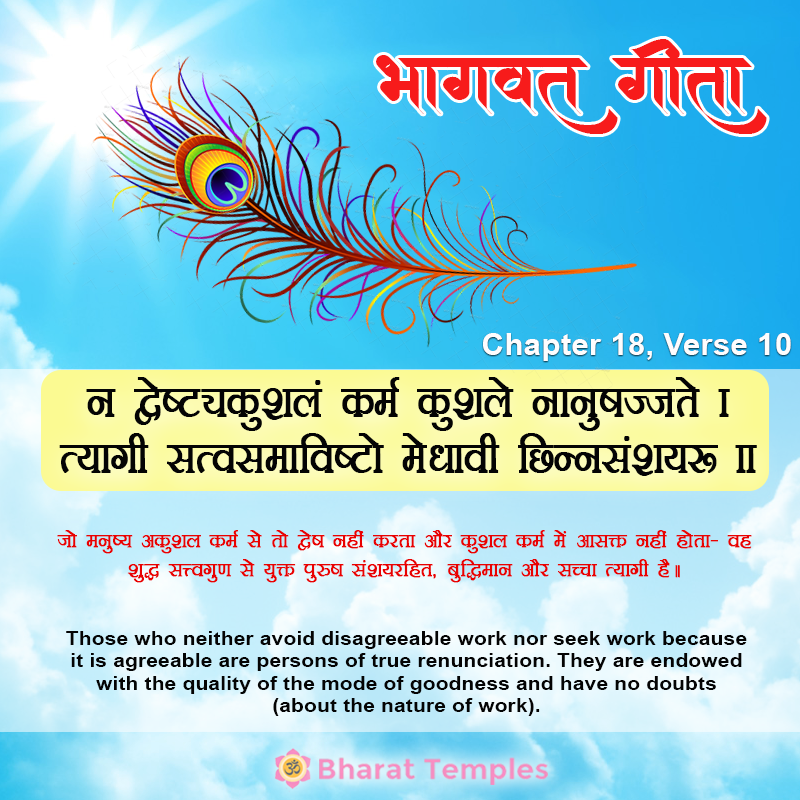न द्वेष्ट्यकुशलं कर्म कुशले नानुषज्जते |
त्यागी सत्वसमाविष्टो मेधावी छिन्नसंशय: ||
na dveṣhṭy akuśhalaṁ karma kuśhale nānuṣhajjate
tyāgī sattva-samāviṣhṭo medhāvī chhinna-sanśhayaḥ
भावार्थ:
जो मनुष्य अकुशल कर्म से तो द्वेष नहीं करता और कुशल कर्म में आसक्त नहीं होता- वह शुद्ध सत्त्वगुण से युक्त पुरुष संशयरहित, बुद्धिमान और सच्चा त्यागी है॥10॥
Translation
Those who neither avoid disagreeable work nor seek work because it is agreeable are persons of true renunciation. They are endowed with the quality of the mode of goodness and have no doubts (about the nature of work).
English Translation Of Sri Shankaracharya’s Sanskrit Commentary By Swami Gambirananda
18.10 Na devesti, he does not hate; akusalam, unbefitting; karma, action, rites and duties meant for desired results-with the idea, ‘What is the usefulness of this which is a cause of transmigration through fresh embodiment?’ Na anusajjate, he does not become attached to; kusale, befitting activity, daily obligatory duties, by thinking that this is the cause of Liberation by virtue of its being the cause of purification of the mind, rise of Knowledge and steadfastness in it. That is to say, he does not entertain any liking even for it, because he finds no purpose in it.
Who, again, is he? Tyagi, the man of renunciation, who has become so by having given up attachment and rewards of action in the manner stated above. He is a tyagi who performs nityakarmas by relinishing attachment to those acts and (their) results.Again, it is being stated as to when that person does not hate an unbefitting act and does not become attached to a befitting activity: When he has become sattva-samavistah, imbued with sattva, i.e., when he is filled with, possessed of, sattva, which is the means to the knowledge that discriminates between the Self and the not-Self; and hence medhavi, wise-endowed with intelligence (medha), intuitive experience, characterized as knowledge of the Self; one possessed of that is medhavai (wise)-; and owing to the very fact of being wise, chinnasamsayah, freed from doubts-one whose doubts created by ignorance have been sundered, one who is freed from doubts by his firm conviction that nothing but abiding in the ture nature of the Self is the supreme means to the highest Good.
The person competent (for rites and duties) who, having gradually become purified in mind through the practice of Karma-yoga in the way described above, has realized as his own Self the actionless Self, which is devoid of modifications like birth etc., he, ‘৷৷.having given up all actions mentally, remaining at without doing or causing (others) to do anything at all’ (cf. 5.13), attains steadfastness in Knowledge, which is characterized as ‘actionless-ness’. In this way, the purpose of the aforesaid Karma-yoga has been stated through the present verse.
On the other hand, since, for the unenlightened person-who, while being alified (for rites and duties), holds on to the body owing to the erroneous conception that the body is the Self, and who has the firm conviction, ‘I am the agent,’ because of the persistence of his idea that the Self is the agent-it is not possible to renounce actions totally, therefore he has competence only for performing enjoined duties by giving up fruits of actions. But he is not to renounce them (actions). In order to point out this idea the Lord says:

